An exploratory analysis of factors that encourage students to choose sustainable modes in travelling to schools: evidence from Victoria, Australia
IF 1.8
4区 工程技术
Q3 TRANSPORTATION SCIENCE & TECHNOLOGY
引用次数: 0
Abstract
ABSTRACTTravelling using sustainable modes, such as active transport and public transport, improves students’ well-being and mental health, and bolsters sustainability. This study aims to investigate factors that encourage students to use sustainable modes which are public transport and active transport. The random parameters (mixed) logit was employed using the Victorian Integrated Survey of Travel and Activity (VISTA) data from Victoria, Australia to comprehensively explore trip attributes, socio-demographics, and built environment factors impacts on school travel mode choice. The inadequacy of model validation in previous research was addressed with the inclusion of the model accuracy test, which arguably is as equally important as behavioural inference. The result showed that travel distance and destination to primary school were the biggest contributors to mode choice probability, negatively affecting sustainable mode choice. The model produced an excellent overall accuracy (85.80%). This research elaborated on the inference of factors affecting mode choice and thus provided recommendations to help develop policies supporting sustainable transportation plans to improve students’ well-being.KEYWORDS: Sustainable mode choiceactive transportpublic transportVictorian integrated survey of travel and activitymixed logitmodel validation Disclosure statementNo potential conflict of interest was reported by the author(s).鼓励学生选择可持续模式上学的因素的探索性分析:来自澳大利亚维多利亚州的证据
摘要使用主动交通和公共交通等可持续的出行方式,可以提高学生的幸福感和心理健康,并增强可持续性。本研究旨在调查鼓励学生使用可持续模式的因素,即公共交通和主动交通。采用随机参数(混合)logit,使用来自澳大利亚维多利亚州的旅行和活动综合调查(VISTA)数据,全面探索旅行属性、社会人口统计学和建筑环境因素对学校旅行模式选择的影响。在以前的研究中,模型验证的不足是通过包含模型准确性测试来解决的,模型准确性测试可以说与行为推理同样重要。结果表明,出行距离和小学目的地是影响模式选择概率的最大因素,对可持续模式选择有负向影响。该模型的总体准确率为85.80%。本研究阐述了影响模式选择因素的推断,从而为制定可持续交通计划的政策提供建议,以改善学生的福祉。关键词:可持续模式选择主动交通公共交通维多利亚出行与活动综合调查混合逻辑模型验证披露声明作者未报告潜在利益冲突
本文章由计算机程序翻译,如有差异,请以英文原文为准。
求助全文
约1分钟内获得全文
求助全文
来源期刊

Transportation Planning and Technology
工程技术-运输科技
CiteScore
3.40
自引率
6.20%
发文量
24
审稿时长
12 months
期刊介绍:
Transportation Planning and Technology places considerable emphasis on the interface between transportation planning and technology, economics, land use planning and policy.
The Editor welcomes submissions covering, but not limited to, topics such as:
• transport demand
• land use forecasting
• economic evaluation and its relationship to policy in both developed and developing countries
• conventional and possibly unconventional future systems technology
• urban and interurban transport terminals and interchanges
• environmental aspects associated with transport (particularly those relating to climate change resilience and adaptation).
The journal also welcomes technical papers of a more narrow focus as well as in-depth state-of-the-art papers. State-of-the-art papers should address transport topics that have a strong empirical base and contain explanatory research results that fit well with the core aims and scope of the journal.
 求助内容:
求助内容: 应助结果提醒方式:
应助结果提醒方式:


